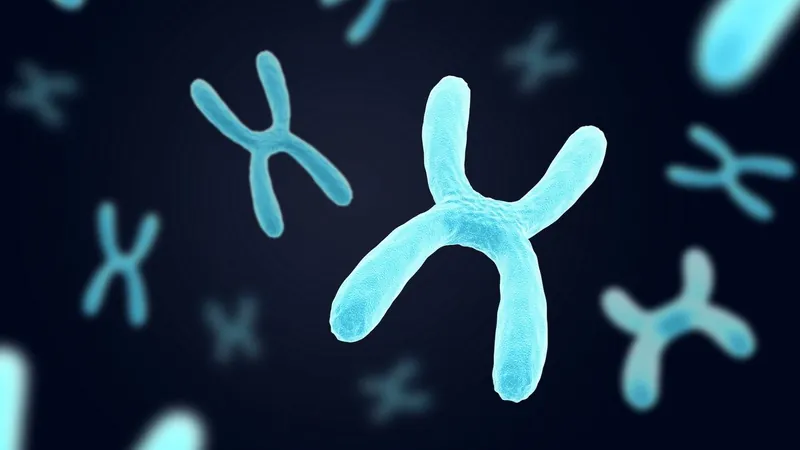
Unlocking the Secrets of the Female Brain: Dormant X Chromosome Genes May Hold the Key to Cognitive Resilience in Old Age!
2025-03-23
Author: Jia
Recent Findings on the X Chromosome
Recent groundbreaking research has unveiled a startling discovery regarding the X chromosome in older females: dormant genes may “reawaken” as they age, potentially providing cognitive advantages not observed in their male counterparts.
This fascinating phenomenon could offer an explanation for why older females often demonstrate greater cognitive resilience compared to males, exhibiting lower rates of various forms of dementia despite having longer life spans on average. This research, primarily conducted on laboratory mice, also included genetic data from human subjects, suggesting that the findings may extend beyond animal models. However, further research is necessary to understand how these insights apply to human aging.
Historically overlooked, the role of the X chromosome in neuroscience is finally gaining attention, according to Rachel Buckley, an associate professor of neurology at Harvard Medical School. “We are beginning to shine a significant spotlight on the X chromosome,” she stated, emphasizing that this research points towards crucial therapeutic targets that could reshape our understanding of cognitive aging in both sexes.
Key Insights into Cognitive Resilience
Intriguing differences in aging patterns between males and females are becoming more apparent through scientific research. Despite females being diagnosed with Alzheimer's disease at higher rates than males, they tend to survive longer once diagnosed. Margret Gadek, the study’s lead author and an MD-PhD student at the University of California, San Francisco, explained, “There are documented trends showing cognitive resilience in female populations compared to their male counterparts.”
Exploring the X chromosome may provide a biological basis for these differences and shift the paradigm of aging. Females typically inherit two X chromosomes—one from each parent—while males possess one X and one Y chromosome. With each cell requiring only one active X chromosome, one of them becomes silenced in females, a process that could influence how the brain ages uniquely.
The Breakthrough Study
Published in *Science Advances*, the study involved crossing two subspecies of lab mice, Mus musculus and Mus castaneus, to investigate gene activity changes as the mice aged. The researchers focused on the hippocampus, a region of the brain essential for memory that shrinks with age. Their exhaustive analysis revealed that approximately 22 previously silenced genes reactivated as the mice aged, hinting at a potential protective mechanism for the aging female brain.
Among these, the gene PLP1 stood out due to its crucial role in producing myelin, the fatty substance that coats and insulates nerve fibers, ensuring efficient signal transmission in the brain. Notably, older female mice exhibited significantly higher levels of PLP1 activity compared to their male counterparts. Moreover, when artificially enhanced in both sexes, PLP1 prompted improved performance on cognitive tests.
Exploring Implications for Humans
To evaluate whether this genetic phenomenon occurs in humans, the researchers analyzed existing data from a large study on brain tissue. They discovered increased PLP1 activation in older women compared to men, suggesting a similar reawakening of these genes within the human brain.
Gadek expressed interest in investigating the implications of these findings in animal models of conditions like dementia and how variations in hormone levels, particularly during menopause, might affect brain health. The decline in estrogen during menopause may promote brain changes detrimental to cognitive function, highlighting the potential for therapy that targets reawakened genes or compensates for neurodegenerative processes.
Next Steps and Future Research
As scientists continue to delve into the mysteries of the X chromosome, the emphasis is on understanding its role in cognitive aging. Importantly, studying the Y chromosome should not be overlooked, as it may also contribute valuable insights despite carrying fewer genes.
This novel research reinforces the idea that exploring genetic differences related to sex is not just a women’s health issue; it has broader implications for understanding cognitive aging in everyone. As we unlock the secrets of the female brain, the potential benefits could illuminate new pathways for supporting all individuals as they navigate the complex journey of aging.
Stay tuned as the scientific community works to uncover even more about the enigmatic interactions between gender, genetics, and cognitive resilience!




 Brasil (PT)
Brasil (PT)
 Canada (EN)
Canada (EN)
 Chile (ES)
Chile (ES)
 Česko (CS)
Česko (CS)
 대한민국 (KO)
대한민국 (KO)
 España (ES)
España (ES)
 France (FR)
France (FR)
 Hong Kong (EN)
Hong Kong (EN)
 Italia (IT)
Italia (IT)
 日本 (JA)
日本 (JA)
 Magyarország (HU)
Magyarország (HU)
 Norge (NO)
Norge (NO)
 Polska (PL)
Polska (PL)
 Schweiz (DE)
Schweiz (DE)
 Singapore (EN)
Singapore (EN)
 Sverige (SV)
Sverige (SV)
 Suomi (FI)
Suomi (FI)
 Türkiye (TR)
Türkiye (TR)
 الإمارات العربية المتحدة (AR)
الإمارات العربية المتحدة (AR)